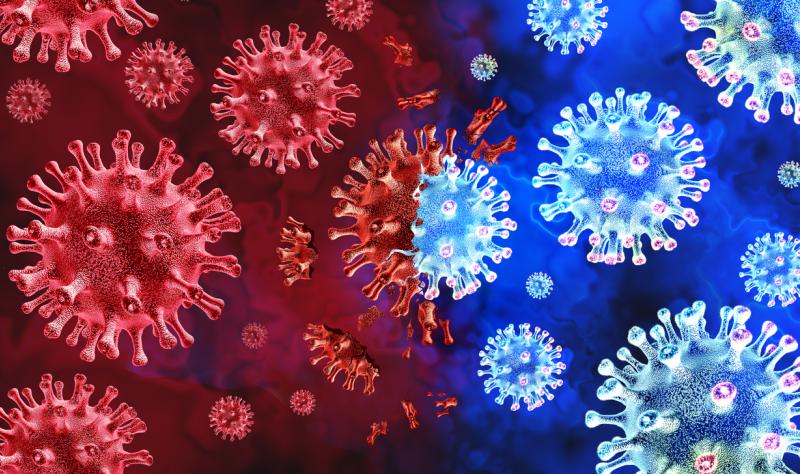
wildpixel/iStock
A new Pew Research Center poll shows 72% of Americans said the pandemic did more to divide the country than bring it together, with 75% saying COVID-19 took a toll on their own lives. The poll was conducted in late October 2024 with 9,593 respondents.
The poll suggests that, 5 years after the pandemic was officially declared in March 2020, the nation has not yet healed from the societal effects of the novel coronavirus, with Americans citing the once-in-decades event as an accelerator of the political divide between the left and the right, the distrust of government institutions, and the rise of disinformation.
Among the three-quarters polled who said the COVID-19 pandemic took a toll on their lives, 27% said the toll was major and 47% said it was a minor toll.
While more than 1 million Americans have died from COVID-19 in the past 5 years, and millions more live with long COVID, only one in five adults (21%) now say the coronavirus is a major threat to the health of the U.S. population as a whole.
A majority (56%) said the virus is no longer something they need to worry about much, as most Americans have been infected with the virus, many multiple times.
When examining poll results through political party affiliations, 60% of Republicans said COVID-19 is no worse than a cold or flu, but 76% of Democrats describe COVID-19 today as worse than a cold or flu.
Fully 60% of Democrats worry we’re not taking COVID-19 seriously enough now, compared with 20% of Republicans.
“Fully 60% of Democrats worry we’re not taking COVID-19 seriously enough now, compared with 20% of Republicans,” the report said.
Political affiliation also colored whether a respondent thought elected officials and organizations like the Centers for Disease Control and Prevention did a good job handling the pandemic, with 79% of Democrats saying public health officials’ response was excellent or good, while 35% of Republicans agreed.
Trust in scientists during the COVID pandemic took a significant hit: In April 2020, 87% of Americans expressed at least a fair amount of confidence in scientists, but that number dropped to 73% in October 2023.
Similarly, 54% of respondents said the media overplayed the threat of COVID-19, exaggerating the risk to the average American.
Also of note, the survey shows that, in the past 5 years, the pandemic changed how Americans work. Before March 2020, 63% of Americans worked outside the home. That’s now 25%, with 75% saying they always or sometimes work from home or remotely.
Similarly, 50% of those polled said their use of technology changed during the pandemic. Equal amount of poll respondents said technology made their lives harder or easier.
Detection of the D1.1. genotype, linked to 2 severe infections in people, came from the national milk testing program.
Also, the CDC today said it has received reports of 14 cases so far this year from 5 jurisdictions.
USDA testing confirmed detections in cats from California, Montana, and Oregon.
Among several more outbreaks on commercial farms, one was at a layer facility in Pennsylvania that has nearly 2 million birds.
Media reports indicate Gerald Parker, DVM, PhD, will lead the White House Office of Pandemic Preparedness and Response Policy.
Uganda last reported an Ebola outbreak in 2022.
Immunity after infection with pre-Omicron strains was 81%, regardless of symptoms, compared with 54% for Omicron.
The index patient’s wife is the second confirmed case, and 3 close contacts are isolated for treatment and testing.
Test positivity topped 30%, with steady rises in emergency department visits and hospitalizations.
Tests on milk from farms in the county where the worker is from yielded the first detection of the D1.1 genotype in dairy cattle.
Help make CIDRAP’s vital work possible
CIDRAP – Center for Infectious Disease Research & Policy
Research and Innovation Office, University of Minnesota, Minneapolis, MN
Email us
© 2025 Regents of the University of Minnesota. All rights Reserved.
The University of Minnesota is an equal opportunity educator and employer
Research and Innovation Office | Contact U of M | Privacy Policy
Newsletter subscribe
